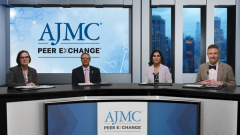
Balancing Deeper Response and MRD Negativity With Toxicity Risks in Clinical Decision-Making
Panelists discuss how to balance achieving deeper MRD-negative responses against increased toxicity risks in transplant-ineligible patients by personalizing therapy through dose modifications, weekly vs twice-weekly dosing schedules, and careful monitoring while maintaining treatment intensity similar to clinical trials.
Achieving deeper responses and minimal residual disease negativity must be carefully balanced against potential toxicity risks, particularly in transplant-ineligible patients who require long-term treatment sustainability. Key toxicity considerations include peripheral neuropathy from proteasome inhibitors, hematologic toxicity from immunomodulatory drugs, and infection risks from prolonged immunosuppression. Treatment personalization involves dose modifications, schedule adjustments, and careful patient selection to optimize outcomes while maintaining quality of life.
Practical approaches to toxicity management include transitioning from twice-weekly to once-weekly bortezomib dosing, reducing lenalidomide doses in older patients, and implementing proactive infection prevention strategies. The fit versus frail patient paradigm requires different treatment philosophies: aggressive initial treatment with dose reductions as needed for fit patients, versus gradual dose escalation for frail patients to avoid treatment abandonment. Multidisciplinary care teams including pharmacists, nurses, and specialists are essential for successful treatment completion.
Patient education and prompt intervention for complications remain critical for treatment success, particularly regarding infection recognition and management. The discussion emphasizes that treatment modifications should maintain similarity to clinical trial regimens while accommodating individual patient needs. Long-term treatment sustainability requires ongoing assessment of treatment burden, with consideration for dose reductions or drug discontinuation after achieving sustained responses, especially in patients maintaining prolonged MRD negativity.
Newsletter
Stay ahead of policy, cost, and value—subscribe to AJMC for expert insights at the intersection of clinical care and health economics.










